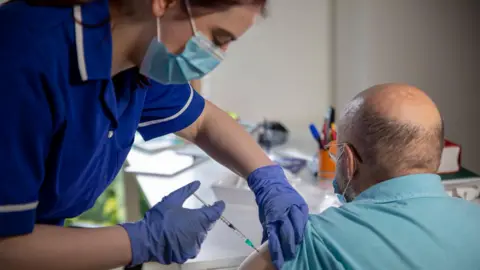Are we in a summer Covid wave?
 Getty Images
Getty ImagesThere is some talk of a "summer Covid wave" at the moment. We all seem to know someone who has had it lately, or a friend who has been off sick.
But have cases really gone up and are there any new variants we should be worried about? What else do we know right now?
Is there a spike in infections?
Possibly, but it is difficult to tell.
National data is not longer collected in the way it used to be, as far less testing takes place now.
Covid is not being recorded in the general population so we do not know how many people have Covid and stay at home.
Testing done in hospitals provides us with a rate of hospital admission from the general population – so we know what proportion of people are getting sick enough with Covid to require hospital treatment.
This data from the UK Health Security Agency (UKHSA) shows in the week to 16 June there were 3.31 admissions per 100,000 compared with 2.67 in the previous week**.
Rates of Covid go up and down throughout the year without necessarily becoming a cause for concern.
Prof Paul Hunter, an epidemiology expert from the University of East Anglia, told the BBC he did not believe the current Covid rates were concerning.
“I think we're probably seeing about as much infection this year as we were seeing last year - a little bit less, but not hugely less.”
He believes that generally, we are seeing far fewer deaths and far fewer hospitalisations from Covid than last year.
Is there a new Covid variant?
In recent months, we have seen a new group of variants of Covid emerge, collectively nicknamed as FLiRT.
They are descended from the dominant JN.1 variant, which is itself a sub-variant of the Omicron strain of Covid.
Together they are accounting for many current Covid cases in England. The KP3 variant, which has driven a rise in cases in the US, has also been identified in the UK in small numbers.
The UK Health Security Agency (UKHSA) said it needed “more data” on the new variants to understand how severe and transmissible they might be.
The agency, which is responsible for public health, also said it was “impossible” to tell at this stage whether these variants were behind the small rise in hospital admissions.
As it does with all new strains, the UKHSA said it would “continue to monitor these variants” in the UK and internationally and would gather more information on how well the vaccines protect people against them.
But the agency said there was no current change to public health advice.
It is normal for a virus to change and mutate and the UKHSA says the healthcare system is still “getting to grips” with the ebb and flow of cases.
Prof Hunter said Covid was now part of life and should not be as alarming as it once was.
He said: “We are all of us going to get repeated Covid infections from births through to death.
"Generally what we've seen is that over the last three years, four years, the severity of illness associated with Covid has gone down a lot.
"Ultimately, it's going to become another cause of the common cold and, for many people, that's what it is now."
He added: “To be honest, you can't really avoid it because it's so common.”
Have Covid symptoms changed?
The official list of Covid symptoms has not changed, according to the UKHSA.
General symptoms can include:
- High temperature or shivering
- New, continuous cough
- Loss or change to your sense of smell or taste
- Shortness of breath
- Feeling tired or exhausted
- Aching body
- Headache
- Sore throat
- Blocked or runny nose
- Loss of appetite
- Diarrhoea
- Feeling sick or being sick
What are the rules around Covid now?
There are no longer any legal restrictions requiring people to self-isolate if they have Covid. You also do not need to take a lateral flow test and there is no requirement to wear masks.
However, government advice is to try to stay at home and avoid contact with other people for five days after testing positive.
People should also avoid meeting people who are more likely to fall seriously ill if they were to catch Covid, such as elderly people or those with weakened immune systems.
“If you are showing symptoms of Covid-19 or flu, help protect others by staying at home and avoiding contact with other people, especially those who are more vulnerable,” the UKHSA’s consultant epidemiologist Dr Jamie Lopez Bernal said.
 Getty Images
Getty ImagesCan you still get a Covid vaccine?
The vaccine programme has been scaled back since the initial rollouts early in the pandemic. Now, only certain people are entitled to jabs under seasonal booster programmes.
They are:
- Aged 75 or over
- People with a weakened immune system
- Adults who live in care homes
Vaccines are good at preventing severe Covid symptoms but they do not necessarily stop you becoming infected. NHS England previously urged anyone who was eligible for the jab to get vaccinated before the spring booster programme ended on Sunday, 30 June.
The latest data showed four million people - 59.6% of those eligible - had been vaccinated under the scheme since April, including two-thirds of care home residents.
Vaccinations are also available privately to anyone who can afford to pay for them.
*Clarification 2 July 2024: To simplify the article, a statistic which referenced one in 25,000 patients having Covid on 26 June has been removed and replaced, to state that 4.37 out of 100,000 hospital patients had Covid. Lines have also been added to explain that this number is likely higher than official statistics suggest.
**Correction 14 October 2024: The above clarification was incorrect. The 4.37 hospital admissions per 100,000 is a population level statistic, i.e. an estimate of the number of people in the population who were sick enough to test positive for Covid in hospital. It is not a measure of the rate of hospital patients unwell with Covid. This stat has now been removed.
